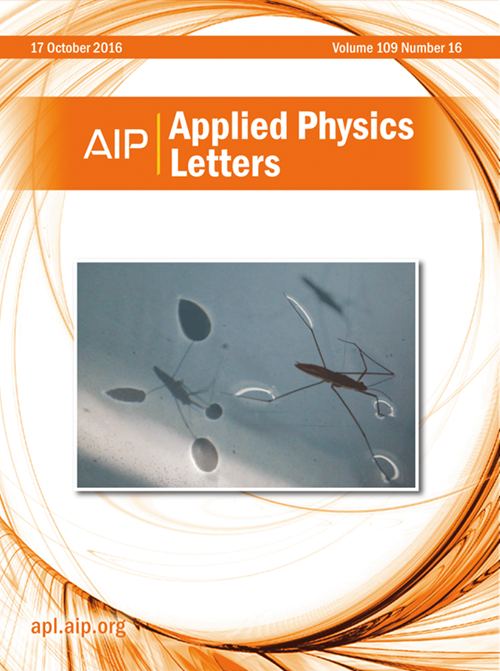Enhanced energy density at elevated temperature in polyetherimide based all-organic dielectrics via UV irradiation
IF 3.6
2区 物理与天体物理
Q2 PHYSICS, APPLIED
引用次数: 3
Abstract
The rapid development of electrostatic capacitors puts forward more stringent requirements for the use of polymer dielectrics, that is, to maintain high energy storage density and efficiency under extreme environments of high temperature and high electric field. In this work, all-organic composites comprising polyetherimide (PEI) blended with high-electron-affinity polymer dots (PDs) have been fabricated and modified by UV irradiation. It is found that the UV irradiated all-organic composites exhibit high energy density (4.1 J cm−3), far outperforming pristine PEI. The energy level diagram and electric conduction results prove that PDs capture free electrons via electrostatic attraction and the wide bandgap forms a barrier to electron transport, which inhibits the electric conduction, leading to the substantial performance improvements. This work demonstrates an effective modification method for the improvement of high-temperature electronics and energy storage devices.通过紫外辐照增强聚醚酰亚胺基全有机电介质在高温下的能量密度
静电电容器的快速发展对聚合物电介质的使用提出了更严格的要求,即在高温、高电场的极端环境下保持高的储能密度和效率。在本工作中,制备了由聚醚酰亚胺(PEI)与高电子亲和性聚合物点(PD)共混的全有机复合材料,并通过紫外线照射对其进行了改性。研究发现,紫外线照射的全有机复合材料表现出高能量密度(4.1 J cm−3),远远优于原始PEI。能级图和导电结果证明,PD通过静电吸引捕获自由电子,宽带隙对电子传输形成势垒,抑制了导电,从而显著提高了性能。这项工作展示了一种有效的改进高温电子和储能器件的方法。
本文章由计算机程序翻译,如有差异,请以英文原文为准。
求助全文
约1分钟内获得全文
求助全文
来源期刊

Applied Physics Letters
物理-物理:应用
CiteScore
6.40
自引率
10.00%
发文量
1821
审稿时长
1.6 months
期刊介绍:
Applied Physics Letters (APL) features concise, up-to-date reports on significant new findings in applied physics. Emphasizing rapid dissemination of key data and new physical insights, APL offers prompt publication of new experimental and theoretical papers reporting applications of physics phenomena to all branches of science, engineering, and modern technology.
In addition to regular articles, the journal also publishes invited Fast Track, Perspectives, and in-depth Editorials which report on cutting-edge areas in applied physics.
APL Perspectives are forward-looking invited letters which highlight recent developments or discoveries. Emphasis is placed on very recent developments, potentially disruptive technologies, open questions and possible solutions. They also include a mini-roadmap detailing where the community should direct efforts in order for the phenomena to be viable for application and the challenges associated with meeting that performance threshold. Perspectives are characterized by personal viewpoints and opinions of recognized experts in the field.
Fast Track articles are invited original research articles that report results that are particularly novel and important or provide a significant advancement in an emerging field. Because of the urgency and scientific importance of the work, the peer review process is accelerated. If, during the review process, it becomes apparent that the paper does not meet the Fast Track criterion, it is returned to a normal track.
 求助内容:
求助内容: 应助结果提醒方式:
应助结果提醒方式:


